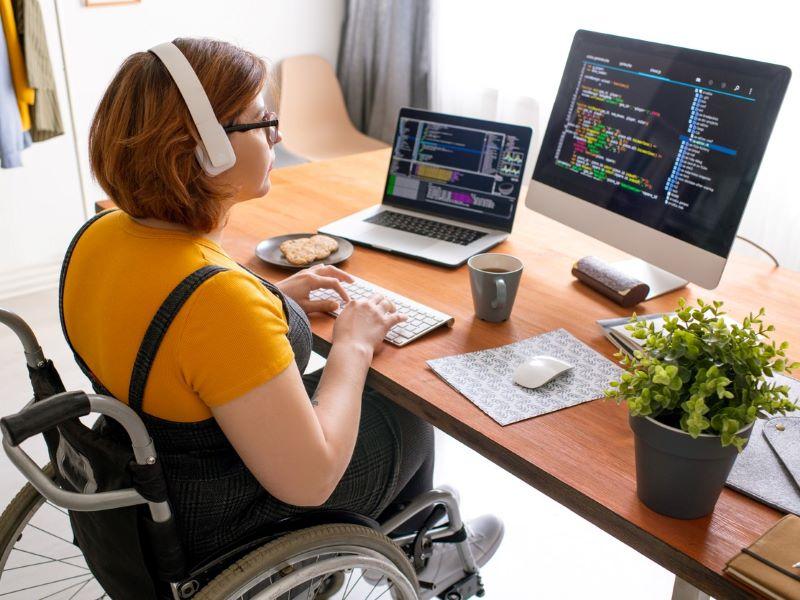
How to promote disabled women in academia
Disabled women are significantly under-represented in senior roles within universities. Here’s how – and why – institutions can and should support them better for career progression
You may also like
Popular resources
As women who work within academia and identify as having a disability, we have noted (through our lived experience, our teaching and research) the intersectional challenges for women who identify as having a disability to remain, progress and thrive as academics. Universities contribute to the structural barriers to our success but within universities is also a wealth of experience among academics (research specialisms in disability and equity) and specialist support staff (EDI, disability advisers) as well as, usually, staff networks and resource groups on disability and gender inclusion.
It raises the question, then: with all this expertise and knowledge to hand, why are disabled female academics relatively invisible within institutions? And why isn’t more being done to address the long-standing and well-researched barriers to our success so that disabled women thrive and reach their academic potential?
- Spotlight: Routes to improving disability support in higher education
- How to make your university more neurodiverse friendly
- 10 ways universities can reject ableism
Here, we suggest ways in which universities can do better.
How intersectionality compounds barriers
Universities need to do more to acknowledge the intersection of gender and disability to ensure disabled women progress in their careers in higher education. Intersectionality explains how inhabiting multiple marginalised identities (such as gender, race, disability or sexuality) may create multiple biases; for example, someone who is both a woman and has a disability may face barriers to progression on different fronts. This intersectional bias makes promotion to more senior roles especially difficult. This is even more problematic if these women possess other marginalised identities such as race and ethnicity.
Women with disabilities offer a unique perspective within HE and have an awareness of the barriers faced by students who also fall into this category.
Statistics show just how under-represented women and those with a disability are
First, some context. Roughly 50 per cent of the population are women and about 23 per cent of the working-age population are disabled, according to 2023 figures from the UK’s Office for National Statistics. These statistics represent not an insignificant proportion of the adult workforce.
In 2023, those in academia who are women and have a disability remain greatly under-represented and significantly so in more senior roles in higher education. Nicole Brown, from University College London, and Jennifer Leigh, from the University of Kent, in their 2018 article on ableism in academia asked “Where are all the disabled academics?”
Statistics from the Higher Education Statistics Agency (Hesa) show that only 6 per cent of staff reported a disability in 2021/22, and 49 per cent of full-time staff and 65 per cent of part-time staff were female. In senior roles in academia, women (32 per cent) and those who identify as having a disability (4 per cent) are significantly under-represented. The national Hesa data accounts for either gender or disability. No intersectional data – as far as we can tell – is freely available that can tell us how many disabled women are employed.
Status of support for disabled women’s academic career development and progression
The UK government’s white paper Transforming Support focuses on disabled people succeeding in the workplace. In higher education, fulfilling potential and progression could be considered the remit of schemes such as Advance HE’s Aurora programme (for women) and Calibre (for those with disabilities), which provide training, development and mentorship. However, these schemes are competitive, with application processes, and not everyone will be selected. Additionally, attendance at these events could take time that could be spent on activities linked to promotion. Attendance on a training package is not a promotable criterium, whereas grant capture and publication are.
Moreover, tackling inequality at an individual level with a deficit-model approach – that if only women, and disabled women at that, were better skilled they would be more promotable – significantly overlooks structural barriers within the HE sector that hinder disabled women’s retention and progression. For example, a sector-wide analysis and report on barriers to mid-career researchers, published in August, by Kelly Pickard-Smith, Helen Ross and Amy Bonsall, from the Eastern Arc collaboration between the universities of East Anglia, Essex and Kent, surfaced multiple challenges for women.
Networks, early support and other ways to boost disabled women in HE
So, how could universities better support and progress the careers of disabled women? We put forward four possibilities:
- Staff networks: Use staff networks to run intersectional events and facilitate discussions about challenges, enablers and barriers that run across different groups, so we engage wide perspectives to solve issues. Disability cuts across intersections of race, gender, sexuality and faith, meaning all those perspectives are crucial to understanding lived experience of disability. As disabled people, we are not a homogenous group. Senior managers must take on board feedback given through these networks to ensure that career development and promotion processes are equitable.
- Early career leadership support: Ensure staff are supported early in their career to plan for possibilities of leadership. Leadership programmes are often designed for staff who are already in a leadership position. Disabled women would benefit from planning for leadership and developing these skills early. Being disabled can have an additional labour penalty of managing appointments, medication, symptoms and conditions; it might take some of us longer to reach milestones, so the earlier the opportunities come our way, the more time we have to both plan for them and achieve those credentials. This could take the form of targeted disability leadership schemes for ECRs, solid mentoring systems or coaching from more senior staff.
- Sponsorship and promotion processes or criteria: Informal hidden routes to promotion centre on certain people being approached with high-value opportunities. Who are you approaching or encouraging to take on promotable, leadership-level tasks? Often, unhelpful assumptions are made about our ability, commitment or interest in promotable and leadership-level opportunities, so we don’t get approached. Consider the promotion process. We may need extra time or support to address criteria. Strict timelines can be tricky to meet, for example, when you are navigating the university’s internal process to secure disability support to complete the application portfolio.
- Actively encourage disabled women to apply for promotion: We suggest that universities and senior managers appreciate that when it comes to promotion, one size doesn’t fit all. Instead, allow flexibility in promotion criteria so disabled staff can demonstrate their skills. Use appraisal processes to support disabled women to work towards promotion goals; and require managers to consider how tasks fit with staff members’ career aspirations when planning and allocating workload.
We believe that all staff who wish to progress deserve equity of opportunity. To develop novel research and world-class teaching, we must include a variety of voices and perspectives. We ignore and sideline the disabled community at our peril for we have much to offer in terms of our intellect, creativity and foresight.
Meredith Wilkinson is senior lecturer in psychology in the School of Applied Social Sciences and co-chair of the DisAbility and Well-being Network (Dawn) at De Montfort University. Kelly Pickard-Smith is honorary research fellow in the Institute of Education at the University of Manchester.
If you would like advice and insight from academics and university staff delivered direct to your inbox each week, sign up for the Campus newsletter.
Additional Links
For more Campus resources related to this topic, go to our collection Gender equality in higher education: how to overcome key challenges.




